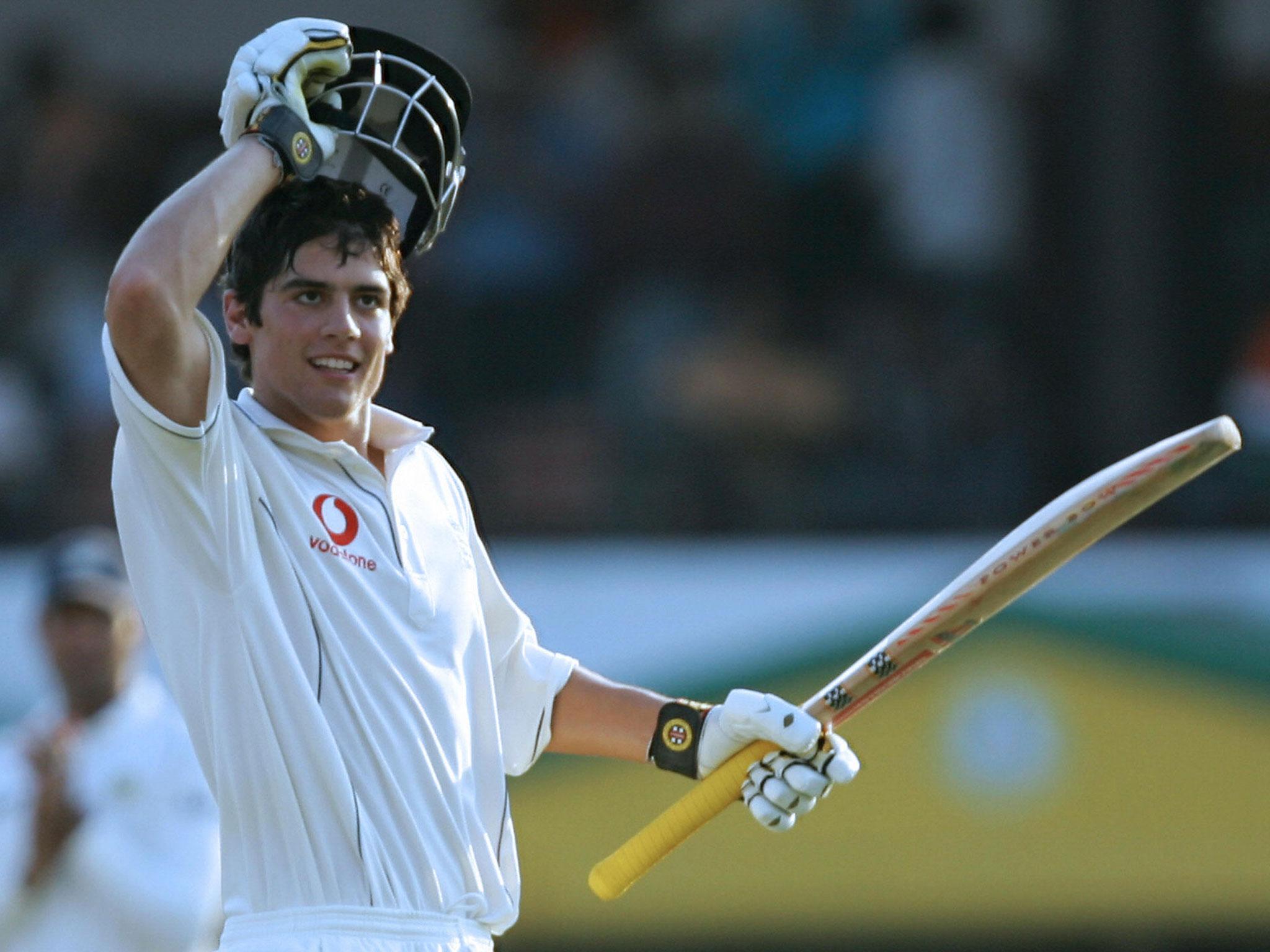Alastair Cook: An England great for whom the beauty of the game was always in the struggle
Posterity will almost certainly underrate him. Future generations will wonder whether he really was worth all those runs. You suspect Cook, for his part, won’t care in the slightest
It’s the fundamental question for all opening batsmen: when to play, and when to leave. And so perhaps it is no surprise that when the time came for Alastair Cook to apply that question to himself, he addressed it with the same equanimity, the same unflappable judgement, the same cold dispassion with which he has treated each of the 26,086 balls he has faced in his Test career. A long and fascinating journey will come to an end at The Oval on Friday, and it reflects as well on Cook the man as it does poorly on Cook the player that, in every sense of the word, it feels like time.
The decline has been gentle but unmistakable. Until 2018, he had never averaged under 32 in a calendar year. So far this year, he is averaging 19. The late-career surge that many foresaw when he gave up the captaincy in early 2017 never materialised. For a man who built his success on a ruthless dedication to self-improvement, every fresh failure, every low number will have cut deep. His judgement around off-stump, the foundation stone to so many of his greatest batting monuments, began to desert him. The leviathan of England’s batting had been cut down to size.
Every so often, of course, he would show us glimpses of the old grit. And as he toiled towards double centuries in Birmingham last August and Melbourne last December, we were fleetingly reminded of what an indomitable force he was at his peak. No sweat, no mercy. There have been more talented England batsmen, more technically-correct batsmen, more dominant batsmen, more artful batsmen. But it’s hard to think of anybody who made more of themselves from the start they were given.
It was a fortunate start, to be sure: a privileged upbringing, a boarding school, a settled family life. Even his first England call-up in 2006 had the ring of serendipity to it: from the beach in Antigua to the cauldron of Nagpur in just a few hectic hours. With barely time to compose himself, Cook strapped on his pads and hit a century on Test debut, the first of 32 he would score. It’s an England record, as are his 12,254 runs and 160 Tests. And on the basis of those numbers alone, there’s a strong case for anointing him as England’s greatest ever.
Certainly he would belong in a top five of England opening batsmen, alongside Jack Hobbs and Len Hutton, Geoffrey Boycott and Graham Gooch. He was fortunate to play in an era where England played more Test cricket than at any point in their history, and an era too where pitches were generally good and great fast bowlers thin on the ground. He was fortunate with his mentors: Gooch at Essex, Andrew Strauss and Michael Vaughan with England. He was fortunate, between around 2009 and 2013, to play with some of the giants of the modern game, the likes of Kevin Pietersen and Jonathan Trott, James Anderson and Stuart Broad, men whose achievements reflected and amplified Cook’s own, culminating in one of the greatest England teams most of us have ever seen.
But though he stood on the shoulders of giants, he made himself into one of his own. Whoever wrote that great cricketers are born and not made clearly never saw Cook. Had you been keeping tabs on England age-group cricket in the early 2000s, you’d have heard about Samit Patel and Luke Wright, James Hildreth and Steve Davies, Tim Bresnan and Ravi Bopara, about Nick Compton and Bilal Shafayat. You’d have heard a little about Cook too, but anyone who says they saw a player with 12,000 Test runs in him at that point is either leading you on or lying through their teeth.
Even when he made his international breakthrough, he made himself indispensable. He worked with a religious fervour on his balance, his foot movement, his trigger movements, his ducking and weaving, aware that what ultimately defines your success as a Test opener is not the range of strokes you possess to the bad balls (and in a 160-Test career you could probably count the number of Cook straight drives on the fingers of both hands), but how many of the good ones you can keep out.
Through an exhaustive process of trial and error and thousands of balls in dimly-lit indoor nets, Cook would find a way. After failing twice in the Ashes of 2006-07 and 2009, he made extensive changes to his technique. A year later, with his place under threat during a home series against Pakistan, he changed it back and made a career-saving century at The Oval.

We all know what happened next. Over the next two years, Cook would score almost 3,000 Test runs at an average of over 60. He would be man of the series against Australia in 2010-11 and India in 2012-13, England’s two greatest away triumphs of the modern era. He would make 294 against India at Edgbaston as England claimed the No 1 world ranking. When we talk about the greatness of Cook, this is the era we have in mind: a point in time when Cook was the most precious wicket in the side, a fortress, a figure who somehow radiated the serene calm that no fan of English cricket has ever taken for granted.
It wouldn’t last. The fallout from England’s whitewash in the 2013-14 Ashes ushered in a half-decade of chaos, with Cook in the eye of the storm. He was egregiously hung out to dry by the ECB over the sacking of Kevin Pietersen, his distrust of the public spotlight and his lack of PR savvy seeing him painted as the villain of the piece. The stubbornness and reserve that had fuelled his rise to the top of the Test game were now held up as vices. A nightmarish 2014, which saw him stripped of the one-day captaincy on the eve of the World Cup, saw Cook very nearly throw in the towel there and then.
And yet, as with many of his greatest innings, Cook endured. As England dispensed with two head coaches, a director of cricket and numerous opening batsmen, Cook pushed on, still etching out runs, still searching for that extra gram of improvement. He sought out his own coach, Gary Palmer, to remodel his technique once again. He made himself into a good slip fielder through sheer palm-numbing practice. As captain, he evolved not just his tactical understanding or his man-management, but his very character, becoming more open, more collegiate, less headstrong, less conservative. The reward was victory in the 2015 Ashes, the win in South Africa in 2015-16. The third age of Alastair Cook, much like the first two, had ended with Cook having the last laugh.
And for all his travails over the last couple of years, you wouldn’t bet against the fourth and final chapter ending in a similar fashion. The odds, it has to be said, are against. As a batsman, the thirst for improvement seems to have tapered off. As a character, he leaves a team that he had a hand in crafting but which no longer bears his imprint. Cook always seemed curiously out of step with the cult of the personality that began to sweep through the England dressing room from around 2015, a team built on individual charisma and a licence to express yourself.

Cook, on the other hand, never felt the need to express himself. He gave interviews reluctantly. He never used social media. He liked to spend his time off not chasing endorsements or burnishing Brand Cook but on the land, birthing lambs or shooting deer in the head. He never seemed to do something simply because it felt good. On the contrary, he always seemed to take the path of most resistance, relishing the toil, pursuing the pain. Even at the age of 33, such was his unbelievable physical fitness that he was still the undisputed champion of England’s brutal yo-yo endurance test, destroying young bucks 10 years his junior.
For Cook, the beauty was always in the struggle. It wasn’t holding the pose after a scintillating cover drive, it wasn’t the pretty 40 in a losing cause, it wasn’t nursing his average, it wasn’t about the fame or the fortune or the celebrity fragrance. It was the exhilarating weariness you feel after batting all day, it was the satisfaction of knowing you had done your bit, it was the immense personal gratification of knowing what you have sacrificed and knowing you could have done no more. It was grabbing a stump as England won at Trent Bridge to win the Ashes in 2015 and handing it to Mark Wood, the most junior member of the side.
England won’t want to replace Cook. In a way, they don’t make cricketers like him any more, the last of the pure red-ballers, the last England batsman to learn his trade in the pre-T20 era. But replace him they will. Cook’s achievements, meanwhile, will soon settle into the dust of history. Posterity will almost certainly underrate him. Future generations will wonder whether he really was worth all those runs, or whether he just played in a soft era. You suspect Cook, for his part, won’t care in the slightest. His work is almost done, his legacy encapsulated in the epitaph that - as he once admitted in an interview - he would like to see on his tombstone. “A nice family man,” it reads, “who was half-decent at cricket.”
Join our commenting forum
Join thought-provoking conversations, follow other Independent readers and see their replies
Comments
Bookmark popover
Removed from bookmarks